Are you considering a new pet? You may have heard about lionhead rabbits, but what exactly are they? In this guide, we will provide all the information you need to decide if a lionhead rabbit should be the next addition to your family!
What is a lionhead rabbit?
History and Origins
If you’ve come to this guide, the most obvious piece of information you’re after is just what is a lionhead rabbit?
Relatively new to the scene, lionhead rabbits have only become popular in the United States since the 1990s. They have steadily gained attention and now are a sought-after pet for those wanting a bit of diversity to their household.
The exact origin of lionhead rabbits isn’t known, but many speculate that they came about by a Neanderthal dwarf rabbit being bred by a Swiss Fox rabbit in Belgium. The result was a gene mutation that created the appearance of a mane or a long ring of fur around the rabbit’s head. Hence the name, Lionhead.
When it comes to status, we can look to the competition world, and both the American Rabbit Breeders Association (ARBA) and in the United Kingdom, the British Rabbit Council (BRC). Both organizations recognized the Lionhead rabbit in the last decade. As a result, you can enter a Lionhead rabbit into competition.
Who they are for
Lionhead rabbits are perfect for anyone who wants a domestic pet and isn’t afraid of trying something new. Lionhead rabbits are the perfect combination of playful sillies and quiet cuddles. If you have children, Lionhead rabbits are the perfect companion.
SIDENOTE: If you’re looking for a rabbit that is very similar in temperament, but has a more traditional bunny shape, you might consider a Rex Rabbit instead!
How to care for Lionhead Rabbits
Grooming
Lionhead rabbits have a lot of hair.
They get their name by their mane-like hair and are super cuddly because of it, but this long fur needs a lot of grooming. Ideally, you should brush your lionhead rabbit at least once a week.
This is the case whether your rabbit has a single mane or a double mane. A single mane will be mostly covered with medium length fur, and a Double Mane Lionhead is more than 50% covered with long fur.
Longer fur means more grooming, so be prepared for that if you opt for a double maned lionhead.
You can purchase a special grooming brush either at your local pet store or online.
Hold the rabbit with one hand and gently work your way through their mane and down their coat.
Lionhead rabbits grow thicker coats over winter and then shed, or molt, during the spring.
When Lionhead rabbits molt, you will need to brush their coats up to three times a week.
Your rabbit will want to help with the process and groom, or lick itself, which it will do year-round. However, when there is an excess of fur, it can quickly start to build up in the rabbit’s digestive tract.
While normal amounts of hair are passed through their system, a build-up, or block can happen when the rabbit is molting.
Help your Lionhead rabbit through this season by increasing the amount of brushing you do. Fur-block is entirely preventable. You just need to invest a bit more time with your rabbit.
Do not bathe your lionhead rabbit. Not only do rabbits hate water, but they can actually go into shock if they are immersed in water. Between its own natural grooming abilities and your supplementary brushing, your lionhead rabbit will be as clean as needed.
Nail clipping
When in the wild, rabbits will need to scratch their way around trees and shrubs, which will naturally wear down their nails. In a residential setting, this won’t be possible for your lionhead rabbit. You should include scratching posts for your rabbit, but you will need to supplement with regular nail clipping.
Ideally, clip your lionhead rabbit’s nails once a month. Special clippers are available to help prevent any injuries. While you’re clipping your rabbit’s nails, it’s also a good idea to do a thorough check for anything else.
Go through your rabbit’s coat to check for any bug bites, including fleas and ticks. Also, look for any lumps that could be a sign of a more serious illness.
Another part of your rabbit to check each month is their teeth. Lionhead rabbits can be prone to misalignment of the teeth, which will lead to unnecessary wear and tear.
Check your rabbit’s teeth to see if they line up and if there are any sore spots along the gums. As always, if you think there is anything serious, be sure to visit your vet.
Diet
In the wild, rabbits eat grasses, seeds, fruits, and vegetables. For your Lionhead rabbit, you should also provide a varied diet. The majority of your Lionhead rabbit’s diet should be hay.
You can buy it in bulk to save on costs but be prepared to make 70 to 75% of your rabbit’s diet hay. Hay is crucial to help your rabbit’s teeth from growing too large.
A rabbit’s teeth never stop growing and instead depend on external forces to keep them filed down. If you notice your rabbit’s teeth starting to grow too long, then you will need to change its diet.
In addition to hay, Lionhead rabbits will also eat a mix of raw fruit and vegetables. You can include leafy greens, celery, and even berries in their diet. Another part of your lionhead rabbit’s diet should be store-bought pellets. These are high-fiber pellets and should make up about 20% of your rabbit’s diet.
| Hay | 75% |
| High-fiber pellets | 20% |
| Raw fruit and vegetables | 5% |
Lifespan
As most Lionhead rabbit owners will have a child or two at home, the lifespan of this animal is important to consider. Too short and you can risk really upsetting a child. Too long, and you might need to re-house your new pet because of unforeseen circumstances.
Thankfully, Lionhead rabbits live in that perfect range, between 4 and 7 years. This is long enough to form an amazing bond with the animal, but not too short as to cause a child to worry about their demise.
Like most animals, the more well-cared-for your Lionhead rabbit is, the longer they are likely to live.
However, certain problems can always arise. It’s a good idea to find a vet that has experience with rabbits and to take your new pet in for routine checkups.
This way if there are any health problems, you can work to prevent them from becoming serious.
Temperament
Lionhead rabbits are gaining in popularity as household pets because of their temperaments.
Not only are they lively and energetic, but they also like to snuggle. Lionhead rabbits are very similar to cats. As kittens, they will enjoy multiple toys, lots of games of chase, and zipping around the house.
As Lionhead bunnies become older, they will often settle down a bit and scope out their favorite place to laze around, or the warmest lap to sit on.
Lionheads are extremely good natured, and combined with the genetic mutation that gives them the long fur around their heads are not only a pleasant pet to spend time with, but pleasant to look at as well.
They are happy to cuddle up and enjoy as much attention as they can get.
Breed information
There are two main types of lionhead rabbits: single mane and double mane. The number of manes comes as a result of the number of genes a rabbit receives from its parent. Two mane genes result in a double mane while one mane gene results in a single mane.
Interestingly, though, you can’t actually tell the difference between a single mane and a double mane rabbit as an adult. They are only discernable at birth. To tell the difference, look for a V formation around the belly of a rabbit. This will signify it is a double mane breed. Single mane lionhead rabbits will look like any other rabbit.
Within the lionhead rabbit umbrella, there are different categories for colors.
- Ruby Eyed White (REW)
- Tortoise (blue, black, chocolate, lilac)
- Chocolate and Seal
- Siamese Sable
When to spay and neuter
When it comes to reproduction, rabbits act like, well rabbits. If you have two rabbits, a male and a female, to be exact, you need to make a decision and you need to make it fast. If you plan on breeding your rabbits, then you will not want to spay or neuter them.
If, however, you do not want more rabbits, then you will need to take them to a vet to be spayed and neutered. The ideal time for a female rabbit is 4 to 6 months, but for a male rabbit, the procedure can be done as early as 8 to 12 weeks.
Keep in mind that rabbits can copulate earlier than this. It’s best to keep your rabbits in plain view and in separate cages until either has been spayed or neutered.
If you aren’t worried about breeding, you still might want to consider spaying and neutering for behavioral reasons. As adults enter their teenage years, they can become quite frisky and over-active. Taking them to the vet can help with this and make them a bit more docile.
Tricks and training
If you’ve ever wanted a cross between a dog and a cat, that would be the Lionhead rabbit. Not only does it snuggle like a cat, but it can be trained to perform tricks like a dog!
Litterbox training
That’s right – your lionhead rabbit can be litterbox trained! The thought of having a rabbit given free-range inside a house inevitably leads to one thought- will there be poop everywhere? Thankfully, the answer is no.
- Let your rabbit roam around the living room a bit.
- Observe where it naturally goes to poop. This should be a consistent place.
- Place the litterbox in this area.
- If your rabbit goes poop next to the box, gently place the rabbit inside to encourage it.
- Litterboxes can be placed inside a cage, as long as there is enough space for food, water, moving, and sleeping.
- Reward your rabbit with a treat at first to encourage good behavior.
Going into cage
Your lionhead rabbit will need a cage to sleep in or be in while you are out of the house. It makes a big difference to everyone if your rabbit actually likes going into the cage.
- Observe what your rabbit’s favorite type of food is and use this as a treat.
- Keep the food in your hand.
- Gently pick up your rabbit and put it near the opening of the cage.
- As you move your hand with the treat into the cage, say the words, “Go in.”
- Once your rabbit is inside the cage, you can give him the treat.
- Repeat for a while and then try without the treat.
Jumping
Hop, little bunny, hop! What better way to impress your friends than to have your Lionhead rabbit perform its amazing jumping feats!
- Select a piece of your rabbit’s favorite food and use it as a treat.
- Choose a time when your rabbit is ready to play; if it is sleepy or hungry, it won’t want to work with you.
- Hold the treat on the couch as your rabbit approaches.
- Say your rabbit’s name and “hop up!”
- Once your rabbit has placed its front legs on the couch, you can give it the treat.
- Begin to move the treat further back on the couch, to encourage her to start jumping.
- Whenever she gets close, give her the treat to encourage more good behavior.
- Repeat these steps until your rabbit has successfully jumped.
How to know if you should get a rabbit
There’s a lot to consider around getting a pet. Before making any commitment, get as much information on the type of animal you are considering. If you’re still not sure if a lionhead rabbit is the right option for you, answer these questions. The more questions you answer yes to, the more likely a lionhead rabbit is right for you.
- Are you willing to commit to a pet for up to 7 years?
- Can you afford at least $60 extra dollars a month?
- Are you prepared for extra fees, such as vet bills?
- Do you like cuddly animals?
- Do you have enough time to spend grooming your rabbit at least once a week?
- Is your home free of aggressive pets, like dogs or ferrets?
Purchasing Information
Costs
A Lionhead rabbit is fairly inexpensive to purchase, ranging anywhere from $50 to $100. However, the biggest expense will be in food. You can expect to pay at least $500 in food costs per year or about $60 per month.
Another expense to consider is your lionhead rabbit’s home. While your rabbit will most likely roam around, either inside or outside, they will need a place to sleep or be kept when no one else is at home. Again, costs vary, but a shelter could be anywhere from $50 to $200.
Before purchasing any pet, it’s important to really think about your budget. Too many pets are returned or re-housed because they are just too expensive to maintain. Lionhead rabbits are less expensive than other pets, however, so are a good idea if you have some money to spend on a new family member but want to stay within budget.
Where to purchase
There are three main avenues to pursue when looking to purchase a Lionhead rabbit: personal sales, certified breeders, and animal shelters.
Personal Sales
If you look on any classified site, such as Kijiji or Craigslist, you will find a pet section. This will be the easiest way to find someone who is personally selling a lionhead rabbit. Often these rabbits will be slightly older and may not have been the right fit for their owners. Or, they could be from a litter of rabbits.
If you go this route, be sure to get as much information as possible. Any past medical histories, including that of the rabbit’s parents, is important to know. If the seller is giving away an older lionhead rabbit, ask how old it is. Remember: lionhead rabbits live about 4 to 7 years. If you are planning on a pet for your child, be prepared for a short time with an older rabbit.
Certified breeders
If you want a baby lionhead rabbit, also known as a kit, then a certified breeder will be your best option. You can find certified breeders on classified sites but also check with local pet stores. The more information you have about the breeder, the better.
While rabbit breeders aren’t often in the news, there are far too many horror stories about puppy mills and unfit breeders. You don’t want to support a person who doesn’t care about their animals. Ask for pictures and if they are near you, ask for a tour of their place.
If you decide to breed your own lionhead rabbits, then you will need to purchase a pair from a breeder. All the necessary paperwork and lineage must be kept for future buyers.
Animal shelters
If possible, check out your local animal shelter for your next lionhead rabbit. Animal shelters can only house pets for so long before a different course of action needs to be taken. And the longer any animal is in a shelter, the bigger the financial burden there will be.
Animal shelters will usually have a surplus of rabbits, including lionhead breeds, as they are not always the right fit for homeowners. Check your local shelter and give an animal its next lease on life.
Alternative rabbits
Not convinced a lionhead rabbit will work for you? You might want to consider these alternatives.
Lop rabbit
Who doesn’t love a bunny with floppy ears? The lop rabbit, which also comes in a miniature version, is the epitome of cuteness. Its ears are extremely floppy and droop well past their shoulders. Their temperament is rather nice, and they are always up for a snuggle. The one thing to caution is that with their long ears comes a propensity for ear infections. You’ll want to conduct routine checks to ensure their health is good.
Netherland Dwarf Rabbit
Lionhead rabbits were bread by both the Swiss Fox rabbit and the Netherland Dwarf rabbit. It makes sense that the latter will appear on this list. When you think about tiny Easter bunnies hopping around, the Netherland Dwarf rabbit will fit perfectly. It is tiny, weighing less than 3 pounds. While their size is adorable, they aren’t as social as other breeds, and actually don’t like to be picked up.
Rex Rabbit
These rabbits have very unique fur that is short and thick. They often have distinguishable markings on their backs, often in zig-zag patterns. Rex rabbits also come in mini versions, if you’re looking for something a bit smaller. They are incredibly social and playful. Health-wise, their thick fur means double duty for brushing to avoid fur-block
FAQ
How large will a lionhead rabbit get?
Lionhead rabbits are rather small, thanks to their original parents. They will grow to be about 3 pounds in weight and about 8 to 10 inches in length. Their ears will be less than 3 inches long. Their mane, which circles their head, will be about 2 inches long.
Should I get one or two lionhead rabbits?
Unlike dogs or cats which are usually fine by themselves, lionhead rabbits are incredibly social. They want to interact with other animals and people. If you are at work a lot, then it’s best to get a pair of rabbits. It might seem like double the work, but they will play together, relieving you of the responsibility. Keep in mind, though, that with double the rabbits comes double the food. Be prepared to budget this in.
Can I keep my rabbit outside?
While you may want to keep your lionhead rabbit outside, thinking it will like it’s more natural habitat, you have to remember that this breed is purely domestic. It was bread to be a pet and as such, should be kept inside. While you can leave it outside for short periods of time, it can quickly be found by predators such as coyotes, rabbits, and eagles. Even in a cage, your rabbit is not safe, so it’s best not to keep it outside at night.
Going Forward
We hope that this guide to lionhead rabbits was informative and helpful. They really are a wonderful pet to have in your home. Their playful nature makes them a natural fit with children, and their quiet cuddles are perfect in the evening.
If you are able to, greatly consider getting a pair of lionhead rabbits (as long as it isn’t a pair of males, since two male rabbits will fight each other), especially if you will be away from the home for the majority of the day. They are social animals and can quickly become depressed or act out if they are too lonely.


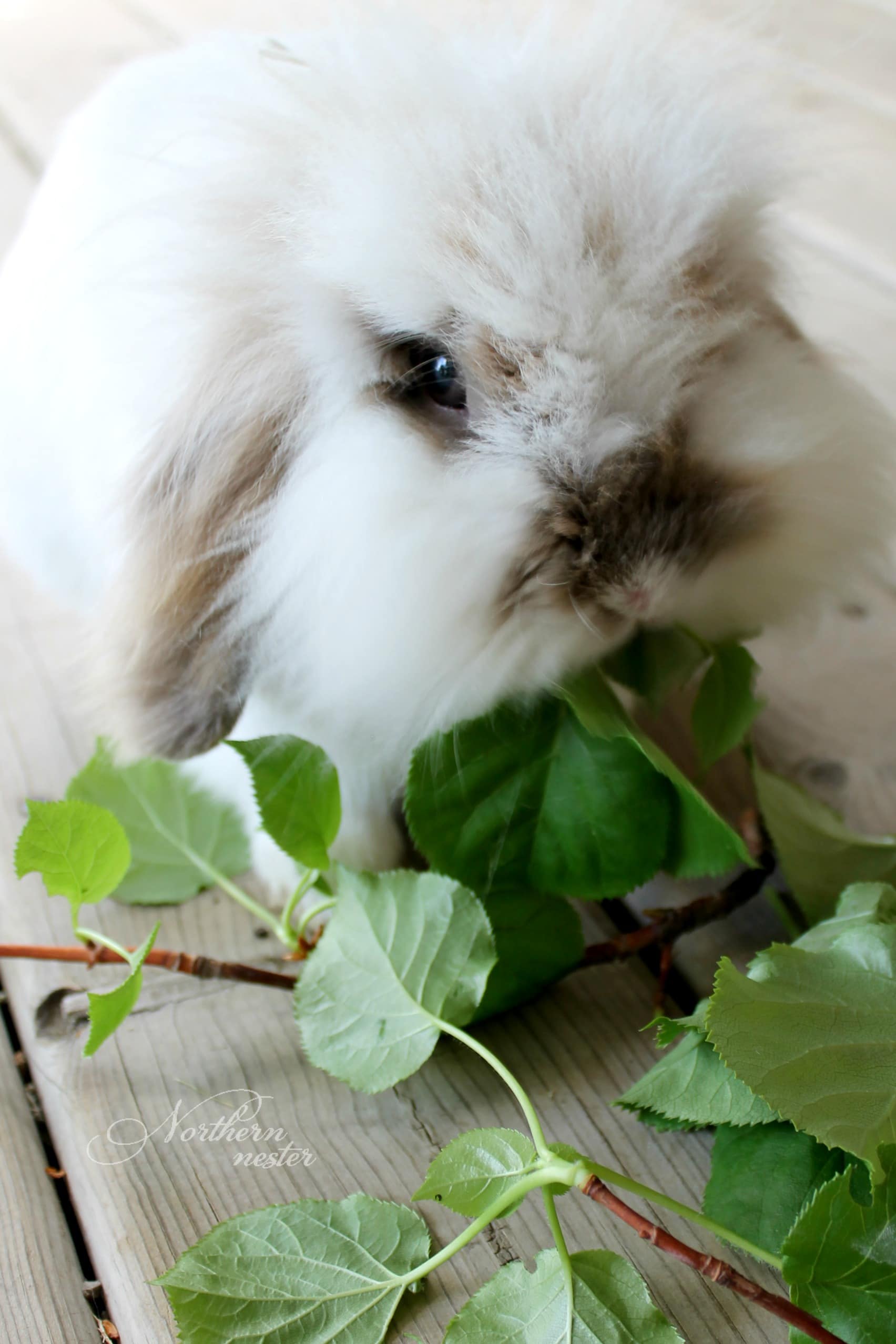
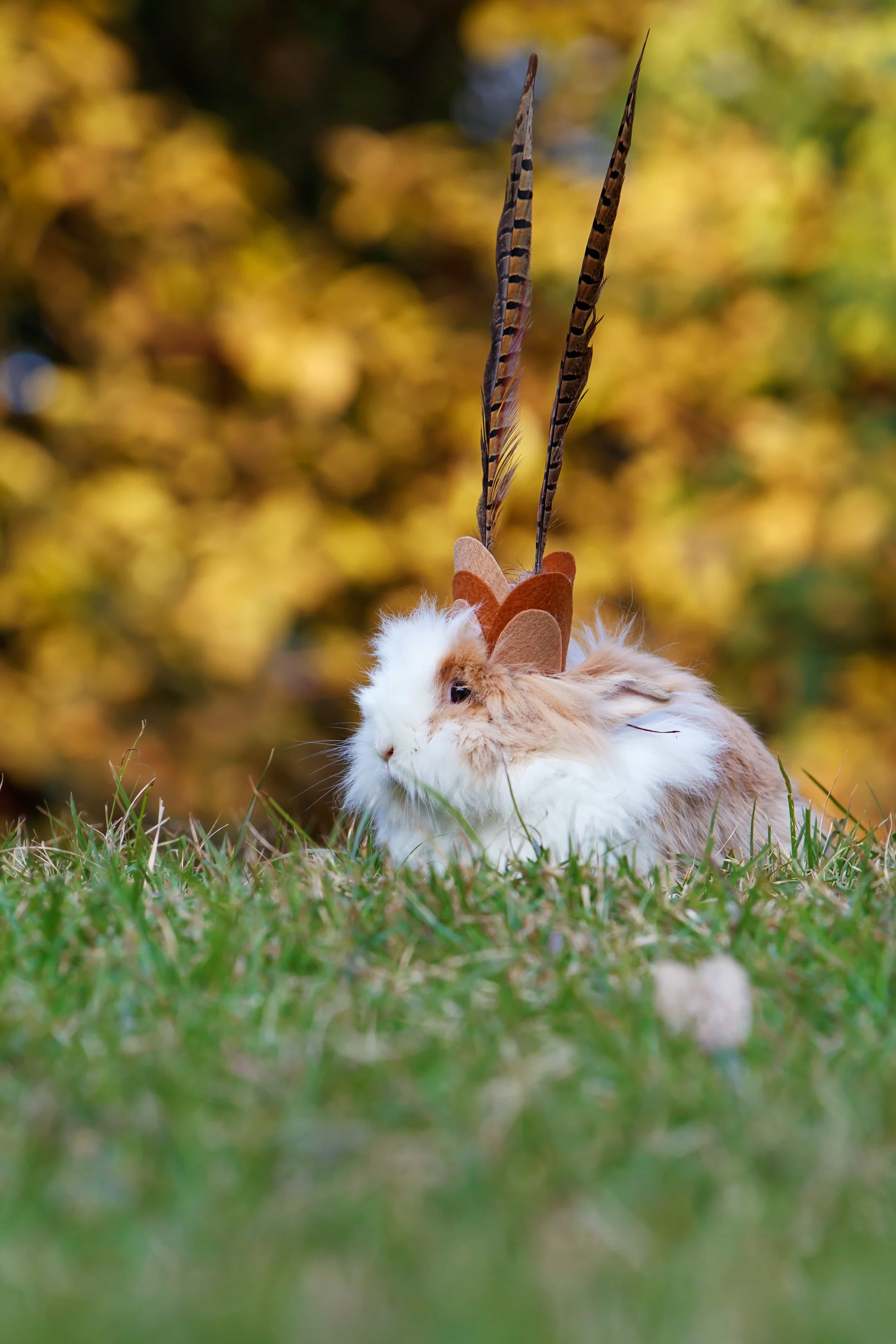


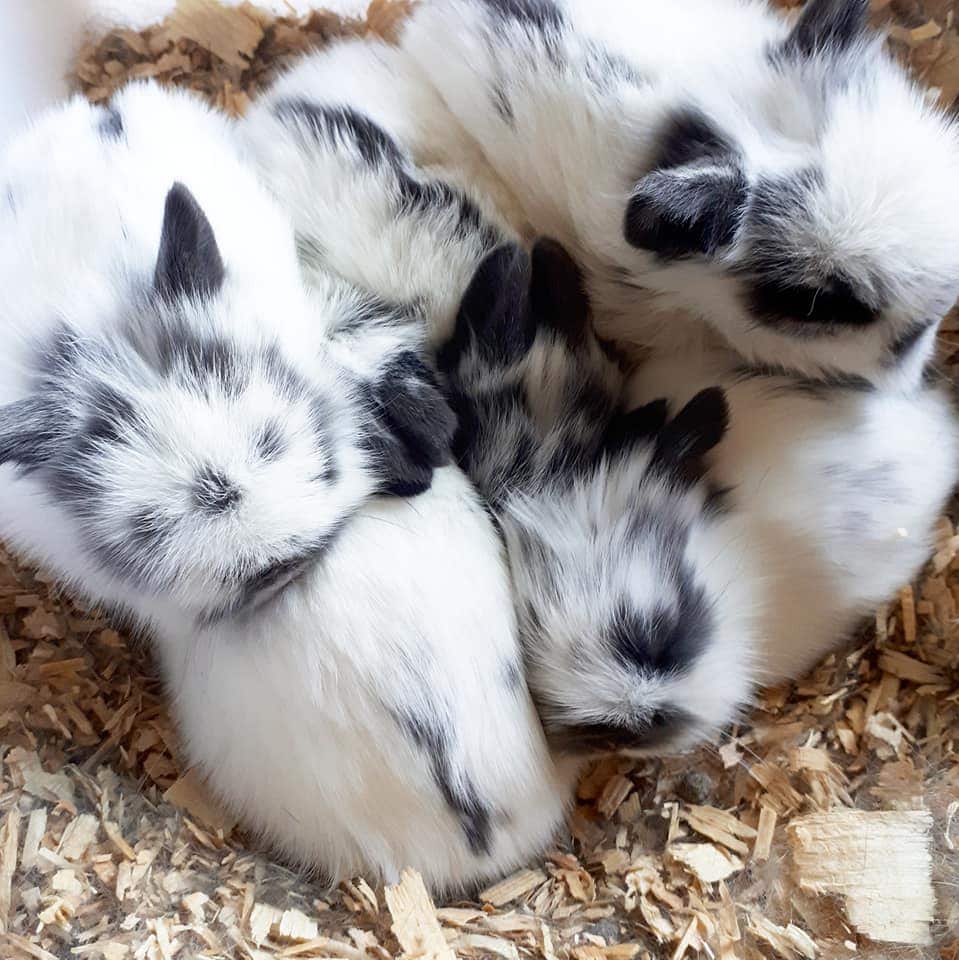
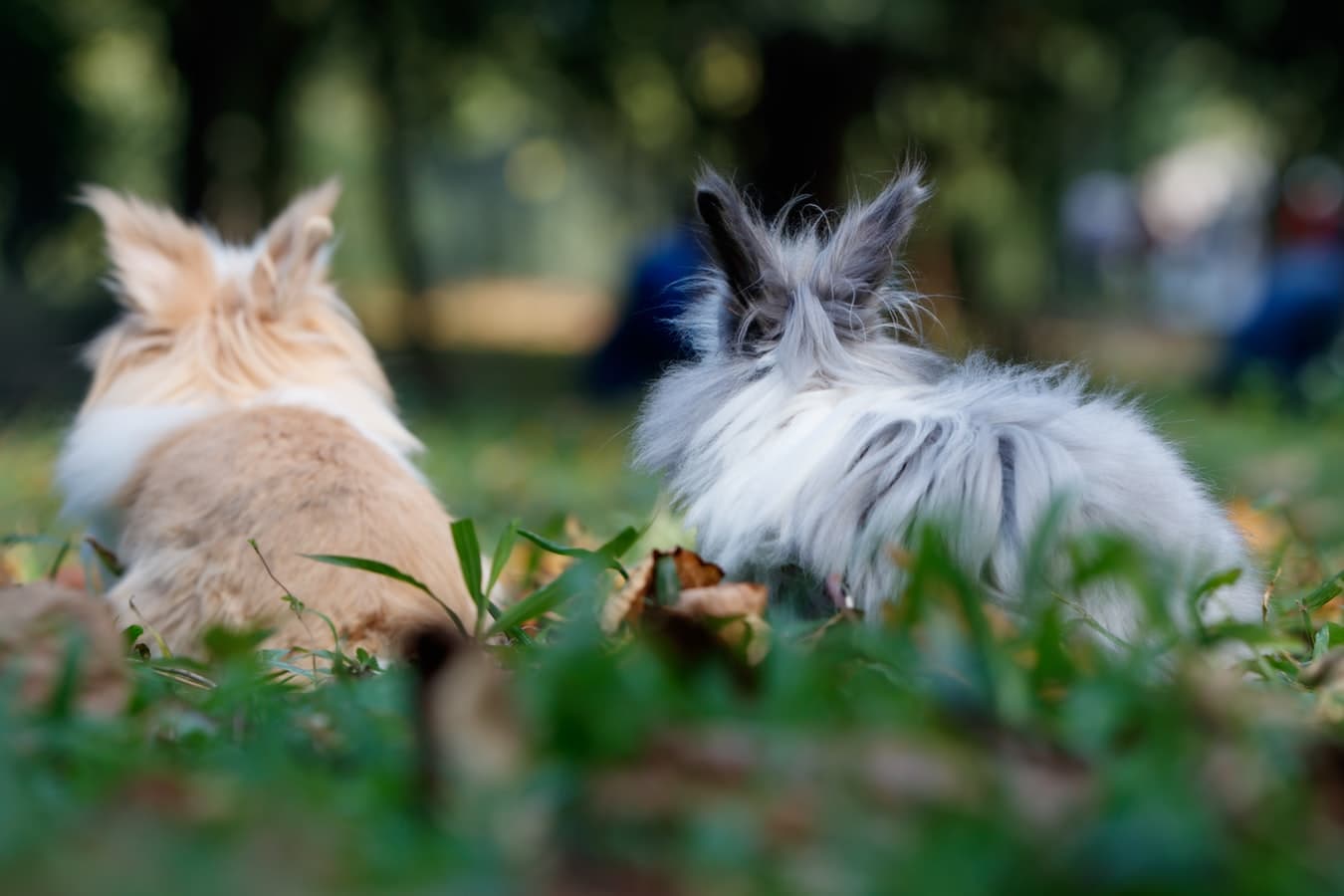

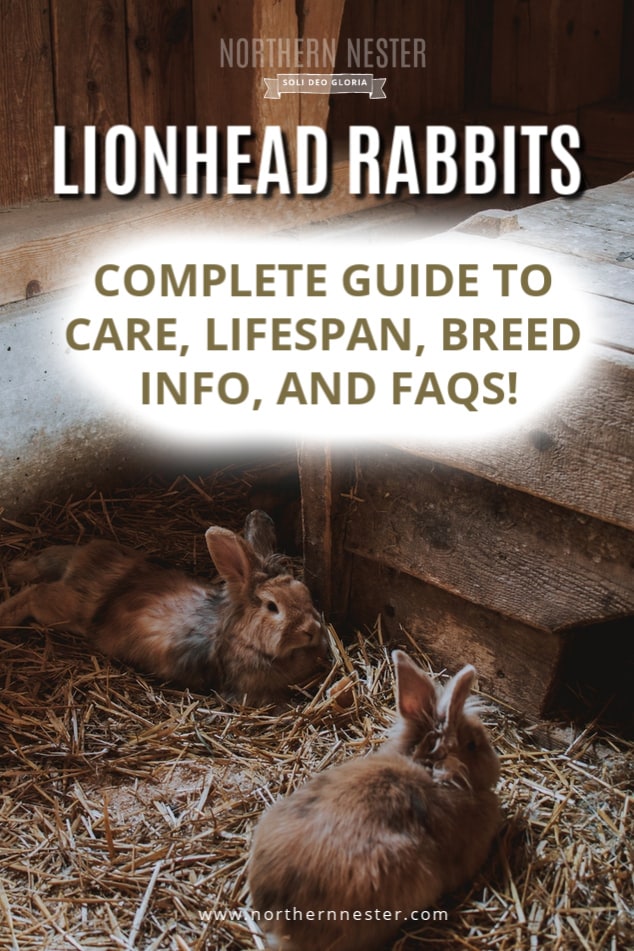
Hello I have a question , I have a Lionhead bunny my kids bought him in June thus past summer- he’s an inside pet. I’m trying to litter train but it’s an epic fail. I am constantly picking up poop pellets. Lol ( not really funny ) . Now he chews carpet and base boards – trying to figure out if I can fix / keep him an keep my house intact ? Any suggestions
Thank you . Julie Hawkes from St. Jacob . Illinois
Hi Julie!
Ouch, yeah that’s not super fun 🙂
We’ve never had rabbits as indoor pets, but know folks who have; so we are actually working on an article about how to litter train rabbits, and I will update this once we have it published.
I put my Waffles in a large crate I put a potty pan in for her and she wanted to sleep inside of it and wet in another corner of the crate. When I let her out I tell her you potty in your potty box and now I see her hop for her crate to potty. But she will not let me set a potty box up so I use a non odor sprinkle it down and put Oak chips on top of it I have to do more cleaning than I would like but for her If she potties in the crate it’s all good. Would like to try cat box but she’s almost 6 I feel bad to change now. Love my bunny
All the best!
The kitty litter box sounds like a good call in this case, and perhaps one without a cover would work best.
It sounds like you might try putting one of these puppy training toilets where she wants to pee: https://smile.amazon.com/gp/product/B00M9NV4OC/ref=ppx_yo_dt_b_search_asin_title?ie=UTF8&psc=1
Just don’t let these get too full of pee without emptying it out.
No luck here either , I have a 6 month old lionhead trying to find him a mate , should i go with a year old female or a baby bunny . I’m also considering a French angoria as it’s mate . I don’t want to make the wrong decision
Angoras have wonderful personalities, but they really are a LOT of grooming… so be warned.
Generally it is easier to bond opposite gender bunnies. If you are in the USA, rabbit rescues and shelters usually have spayed females available (although it can sometimes be a challenge to wrest one from their overprotective clutches). One of those would be the best companion for your lionhead (unspayed females can be obnoxious). I just introduced a male lionhead to my two bonded spayed female rabbits and after only one day they have gotten past the constant attempted humping phase and are hanging out peacefully together.
Our family shared our lives with an amazing lionhead rabbit. He was 8 years old when he passed away. He was extremely entertaining and a lovely companion. My daughter was 11 when we adopted him at 8 weeks old. I think they are fantastic pets.
We too just adopted a Lionhead bunny due to the owner found out she was allergic to him He’s 2.5 years old and litter trained, Yay! He hasn’t been neutered and he’s not “lively”. He does follow our voices and joins us, as if we are his herd. He usually does his active (slow hopping around the house) about twice a day. He has Timothy hay readily available at all times, but he seems to prefer his Timothy hay pellets as his main meal. We give him an occasional treat and a small piece of carrot, kale, spinach, celery leaves or lettuce mix at least once a day. Now to my question…does this sound like normal behavior for his age and is it too late to neuter him?
Hey Carroll!
That sounds exactly like our first Lionhead rabbit 😀
He was such a great rabbit to start with, we thought all rabbits were so docile and friendly…then we got him a spouse and found out rabbit personalities are as varied as human’s personalities are 🙂
As for neutering, we don’t have a lot of experience with this, but it’s generally accepted to be fine even later in their lives. If we can avoid it, we would rather do that.
But, if you go for it, just expect a recovery time and perhaps a temporary personality change (hurt animals tend to be a bit more protective of their personal bubble) but once healed should be back to his normal self 🙂
I had a male rabbit neutered and it was fine. It is an extremely minor procedure for the males. Although, it did not improve his peeing everywhere behavior as I’d hoped. He was raised on wire and may have had an underlying health condition even as early as when I first received him from his previous owners. So there could have been other factors.
Spaying my female rabbits was crucial, but they were pretty angry about it (they hate me no matter what I do, though). They are a bonded pair and got into a horrible fight when they reached puberty. After recovering from the spaying they were fine again and went back to adoring one another. Spaying is also way more invasive and expensive. I actually think I will never again get a female pet because of these differences.
My lion head rabbit was a bunny when me and my family got her, I’m not sure exactly how old. We got a litter box and we put the litter/bedding in there and the bunny primarily pees in it, sometimes poop. But mainly poops wherever. It’s been about 2 months now and she poops whenever she walks around the house.
can they live outside in a hutch? all 4 seasons?
My lionhead rabbit mom died after childbirth and only one baby survived. The little kit is roughly 11 days old now, weighs right around 3 oz. I’ve been looking online to figure out what to feed it (I say it because not sure if boy/girl), how much, how often, couldn’t find kitten replacement milk around here and ended up making a mix of goat milk, with heavy cream. It loves the mix and started out eating around 2-2.5 cc each feeding the first few days and now is up to 4-4.5 cc each feeding, though stop when he seems to lose interest and sometimes that’s at 3 cc. I know they say to feed them twice a day, but the poor thing is ravenous after 4 hours, so I’m feeding him/her 4 times a day (7 am, 12 pm, 5 pm, and bedtime/9-10 pm). It’s eyes aren’t quite open all the way, but has started to poop and pee on its own (pee looks like normal pee, poop is small yellow/greenish balls) and I put some hay and shredded carrots and he/she eats on that too. The kit seems happy, healthy, hobbles around in the kennel, loves to climb the blankets, but doesn’t seem to be gaining weight daily. I can’t find anywhere online how much weight a little baby lionhead should gain daily to know it is healthy and wondered if anyone here might know? And if there’s anything I should be doing differently for a lionhead in this situation? Thank you!
I’m happy to report that my baby lionhead is doing great… weighs nearly 4 oz now from the 2.7 he/she was when I first weighed and is now around 3 weeks old. Eyes wide open now, and moves around quite well. Loves the timothy hay and I started to give him/her a bit of fresh parsley and absolutely loves it! Definitely a grazer and about halfway between milk feedings I find the baby feeding on the hay. Has definitely grown almost overnight and all seems great. Loves to nuzzle on my neck and clicks his/her teeth softly, which I take might be some purring? Licks my fingers and nibbles at them too, almost lovingly. The little kit has filled my heart and is just the sweetest thing. I never would have thought a little rabbit would come to mean so much or would be so sweet and loving. They certainly are very different from other pets I’ve had but I love this little kit and so happy to see he/she made it through these last two weeks without his mommy. 🙂
Hi Marta,
Thanks so much for circling back to update us! So great to hear the kit is doing great – way to go 🙂
They are amazing creatures, a real testament to the brilliance of our Creator 🙂
Our lionhead buck was a real pleasure as well, and had a perfect temperament. Sounds like yours is off to a great start and we hope you continue to enjoy.
Thanks for the update!
Hello all! I’ve recently got 2 beautiful double mane lion heads. Sisters 8weeks old. I’ve only
Had them 48hrs and noticed That one is snoring quite loudly when in a deep sleep! At first I thought it was so cute but after a google I’m now a little worried? Is this normal with this breed? I find there little faces to be very flat so wouldn’t surprise me but I can’t find much online…. no noise at all when awake and happily eating and drinking.
Hi there! Our male lionhead, Juji, is a little over a year old and has not been neutered. We “rescued” a spayed female (a couple of years old) as a companion for him, and am wondering if they will ever bond. They are in separate pens, and he seems to try to nip at her when he goes by. When they meet in neutral territory, they either nip a bit or ignore each other. Will this ever work??
Hi Lynn,
It is (sadly) very possible that they won’t bond.
We had this with a couple of ours. He loved her, but she didn’t love him back.
It’s unfortunately not something that you can force.